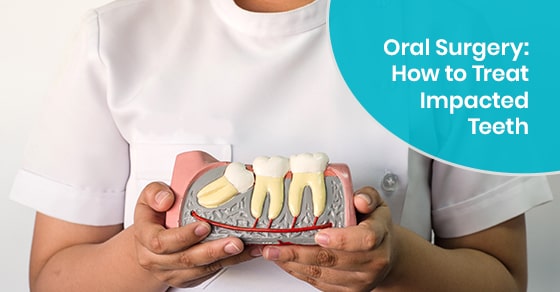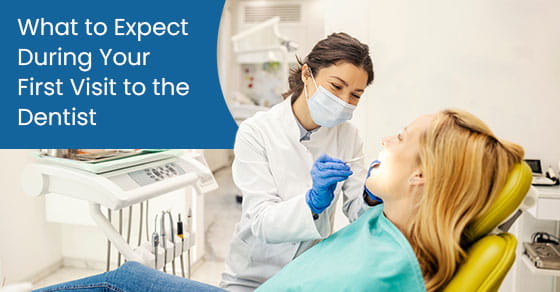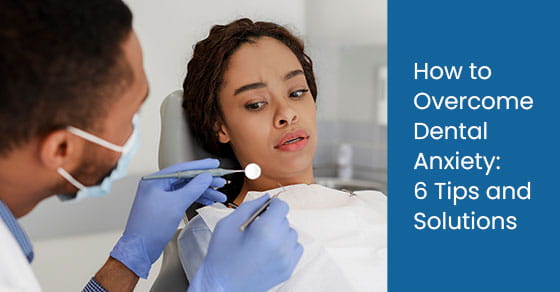When your child’s baby tooth falls out, it gets placed safely under their pillow and they wait excitedly for the tooth fairy to leave them a shiny coin.
During this time, their teeth and gums are working and preparing for the eruption of their new adult teeth. It can be an exciting time for a child waiting for their adult teeth to come in.
Unfortunately for individuals with impacted teeth, this time can be difficult. Impacted teeth are teeth which, for any number of reasons, are blocked from breaking through the gums, and may require professional intervention to help them come in.
Impacted teeth are those which do not erupt when they are expected to, cannot erupt because they don’t have sufficient room to do so, or the impacted tooth is erupting in the wrong direction or position.
In some cases, a tooth may be partially impacted, which means it has started to break through the gums to a certain extent. It is unclear why some individual’s teeth don’t erupt at the appropriate time without any assistance. It is believed that genetics may play a role in this, so if your parents had impacted teeth, there’s a greater chance that you will experience the same problem.
Luckily, there are ways to help deal with impacted teeth and make sure that any teeth waiting below the gum’s surface can be given the opportunity to erupt and complete your beautiful smile.
Which Teeth are Usually Impacted?
Different types of teeth can be impacted, but it is usually the wisdom teeth which are typically affected because they are the last teeth to grow in between 17 to 21 years of age.
As you get older your jaw grows, but by the time your wisdom teeth begin to come in, your jaw has usually stopped growing. This means that there may not be enough room in your mouth for your wisdom teeth to grow, so if you have a small jaw you’re more likely to have wisdom teeth that are impacted.
The second most common type of teeth to be impacted are the maxillary canines, also known as the cuspid or upper eyeteeth. Unlike wisdom teeth, which don’t serve an important function and can be removed if they are impacted, your maxillary canines play an important role in your mouth.
If they become impacted, an oral surgeon will recommend treatment for these teeth to help them erupt rather than simply removing them.
Symptoms and Complications of Impacted Teeth
If you have impacted teeth in your mouth, they may go undetected and present no symptoms. Impacted teeth that are asymptomatic can be difficult to detect, and in some cases may only be discovered during a routine x-ray when you visit a dental professional. However, there are some cases in which you could experience symptoms which may come and go over weeks or months and can include any of the following:
- swelling, bleeding, or redness of the gums
- bad taste in the mouth
- bad breath
- pain or difficulty when chewing, biting, or opening your mouth
Teeth which haven’t broken through the surface and don’t have any exposed surface above the gum line, cannot be cleaned or cared for.
On the other hand, partially impacted teeth that have started to erupt will require cleaning, however, this isn’t necessarily easy to do. Therefore these partially impacted teeth are at a higher risk of a variety of dental problems such as the following:
- Tooth decay
- Cavities
- Gum disease and infection
- Misalignment and crowding of surrounding teeth
- Cyst formation causing damage to tooth roots, nearby teeth, and bone
- Absorption of bone or surrounding teeth
How do you Treat Impacted Teeth?
If you are experiencing any of the above symptoms, then it’s time to visit a dental professional so they can investigate the cause of these symptoms. Your dental professional will examine your mouth and teeth and conduct x-rays to determine if your symptoms are caused by an impacted tooth.
If they determine that it is an impacted tooth that is causing trouble, there are a few treatment options they may suggest and discuss the benefits and risks of each. The different types of treatment options available for impacted teeth include the following:
1. Waiting and Watching
When you have an impacted tooth that is asymptomatic and does not cause any physical pain or discomfort, it might be best to leave the tooth alone.
Rather than opting to surgically remove the impacted tooth, it might be better to wait and closely observe the tooth to see if any problems begin to develop, or if the tooth erupts on its own, which is the best-case scenario.
In order to keep a close eye on your teeth, you will need to schedule regular dental check-ups to allow a dental professional to monitor the status of your impacted tooth.
2. Aiding the Eruption Process
If a tooth is important and cannot be removed, sometimes there may be no other choice but to wait and allow it to erupt, and this process can be escalated with the help of a number of eruption aids. Eruption aids may be used for impacted teeth such as canine teeth, which shouldn’t be extracted.
In order to help aid the eruption process, a number of aids including braces and brackets can be used. The results of these aids have proven effective in younger individuals. Unfortunately, if these eruption aids are not successful, then the impacted tooth will need to be removed and a replacement tooth will be put in its place.
3. Oral Surgery
Sometimes, the symptoms of an impacted tooth can cause quite a bit of discomfort and pain. In these cases, extraction surgery may be the best solution, especially if the impacted tooth happens to be a wisdom tooth.
Extracting the tooth may seem like a very invasive option, but if your other teeth are being negatively influenced by the impacted tooth, removing it all together may be the best option.
Oral surgery to extract your impacted tooth is a short and simple outpatient procedure that is conducted in-office by an oral surgeon under local anesthesia. The procedure lasts between 45 to 60 minutes, and you are able to return home the same day.
Although the recovery process can last between one week to 10 days, you don’t need to restrict yourself to bed rest and can usually return to work or school within a few days following the procedure.
How do I Manage Pain Caused by my Impacted Teeth?
Pain caused by an impacted tooth or teeth can be uncomfortable and sometimes difficult to tolerate. To help ease some of the pain, you can use a number of remedies including the following:
- Over-the-Counter Medications
Pain medications such as Aspirin can be effective treatments for mild to moderate pain caused by an impacted tooth.
- Ice
When your impacted tooth causes inflammation and swelling, ice can help to reduce some of these symptoms.
- Warm Saltwater
To help relieve some of the pain, gargling, and swishing around warm salt water in your mouth can be an effective remedy.
Prescription Pain Medications
If the pain from your impacted tooth becomes too severe, you may require a medical professional to prescribe you a stronger pain killer
Home remedies can be effective in managing some of the symptoms of an impacted tooth. However, if you experience any kind of pain or other symptoms, it’s important to have a dental professional perform their examination to determine if there are any problems.
Home remedies should only be used as a short term means of pain management. Early detection can help ensure that you receive the appropriate treatment for your problems. An impacted tooth that is causing you pain will need to be surgically removed or treated with other medical interventions.
If you don’t experience any pain in your impacted teeth, then you may not require any medical intervention at all. If, however, they are causing you pain, the impacted tooth or teeth will have to be removed to prevent them from causing infection or damaging any of the surrounding teeth.
When it comes to your teeth, it is important to have regular check-ups with a dental professional to catch any problems in their early stages. Remember, an ounce of prevention is worth a pound of cure.
To learn more about how to treat impacted teeth, call Bristol Dental at (905) 712-3409 or contact us here.






[…] some cases, gum surgery is inevitable; however, dental scaling and root planing may be performed prior to surgery to remove plaque and […]